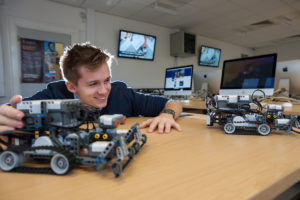About this course
From the underlying principles to the very edge of modern technology, this programme will cover all aspects of Computer Science and ensure that when you graduate you will know exactly what is and isn't possible with computers.
Introduction
Study Computer Science at Liverpool and develop a deep understanding of the technology that underpins much of modern life and society. Computer Science is a great choice for those with a keen interest in computers, software and technology. You’ll create functional applications as well as how to consistently iterate and improve your work.
Students on all Computer Science BSc degree programmes need to learn the fundamentals and core theory of computer science, whichever degree or specialism they’re studying.
In Year One, all students start with an introduction to procedural programming using commonly found language platforms, before moving on to learn about the importance of hardware and software components within the operation of computer systems, formal analytic techniques, Data structures, algorithms and the development of artificial intelligence.
After learning this core theory, you can choose to maintain a balanced mixture of modules throughout your degree and graduate with the degree title Computer Science BSc (Hons). Or you can opt to develop specialist knowledge in selected areas of computer science and graduate with a specialism degree title, by choosing one of the following pathways:
Computer Science BSc (Algorithms and Optimisation) (Hons)
Computer Science BSc (Artificial Intelligence) (Hons)
Computer Science BSc (Cyber Security) (Hons)
Computer Science BSc (Data Science) (Hons)
This course is also available as a four year MEng (master’s) programme Computer Science MEng, or with options for a Year in Industry, a Year in China or a Year Abroad.
Our Computer Science BSc programme and pathways are accredited by the British Computer Society which means that the course is continually updated and adapted to reflect new technologies and emerging trends.
Accreditation
Accredited by BCS, so opens up a wide variety of career opportunities with excellent employment prospects.











